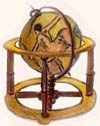 |
|
"a rare pleasure to see science melded so accurately and intricately with poetry"
 Three poems from Satan is a Mathematician by Keith Allen Daniels
 |
Monster Book of Poetry ___by Peter Howard Satan is a Mathematician - poems of the weird, surreal and fantastic by Keith Allen Daniels Anamnesis Press, 1998 ISBN 0 9631203 6 0 This isn't a collection that makes a lot of concessions to any limits of the reader's vocabulary or knowledge of science. True, there is a footnote to the poem Seals explaining that these are marine mammals of the family Phocidae (this is ironic, I assume, though Daniels may be taking precautions against wrong-footing us with his epigraph, which is from Revelation 8:1) but there is no assistance for the plethora of exotic words in a poem such as Bight of Sonic Blasters. If your wordpower is as constrained as mine, you'll need a dictionary's assistance to negotiate benthic, smaragdine and dulse. Not that I'm complaining, mind you - the words are not used capriciously, but precisely. They do their proper job of saying what needs to be said as concisely as possible. The title-poem of the book (which made me laugh aloud) is both macabre and hilarious, but depends for much of its humour on a knowledge of the distinction between countable and uncountable infinities. No more than you'd find in a book of popular mathematics, though I suspect this will elude some readers. The poem Seals I mentioned earlier is one of the angriest poems in the book, an eloquent and moving philipic against seal culling: Their phocine eyes weep not Several other poems have more general environmental concerns. Gray Dorian likens the moon to a portait of a ravished Earth; Reign, Forest! tells a surreal story, the subject of which is plain from the punning title. Many more poems have the science fiction writer's concern with humankind's relationship with the rest of the universe, and with whatever God might turn out to be. Daniels has an enviable knack of painting a lucid and believable scene that might have come from a sf novel. At the Pet Shop for example, has a parent and child choosing from in interplanetary menagerie: Piezoelectric I said it can't be alive The more sinister Eugenica is also an effective sketch of a futuristic society, where things are superficially very different, but many of the preoccupations of its members much the same as they always have been. For these spaceborne disposers of human garbage: Decon lasted a week, The tone of this poem is characteristic of many in the book. It's a sort of ludic gruesomeness: Daniels relishes making us shudder at close-ups of mutation and decay, his latinate and sesquipedalian language turning words themselves into products of teratogenesis. From Too Late the Ootheca, for example: his eyes became occipital and strange, Elsewhere, there is playfulness and experimentation without the grue, in short concrete poems, poems written back to front or
inside out, and one where the words of each 26 word stanza are in alphabetical order. Standalone, these might seem more exercises
than finished poems, but they do earn their place in the collection, highlighting the lexicographical inventiveness that is
integral to the more substantial pieces. This is a much wider-ranging collection than its subtitle might suggest, and it is a
rare pleasure to see science melded so accurately and intricately with poetry.
|
||
